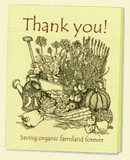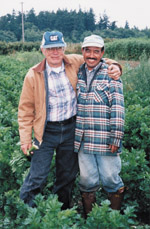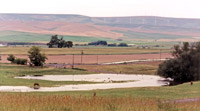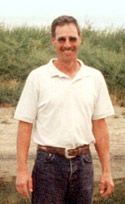Thank your local organic farmer: help keep our food close to home
by Stephanie Taylor, Director, Farmland Fund
This article was originally published in November 2004

(November 2004)
Thank your local organic farmer: help keep our food close to home

We’ll send a card to the farmer of your choice.
Please join us in thanking our Washington farmers. They do the work and take the risks to provide us with sustainable sources of fresh, local produce.
Send a gift to the Farmland Fund and we’ll mail this card to the farmer of your choice or choose a farmer for you from the Washington Tilth Producers Directory. Let us know what you’d like to say. All contributions will be used to preserve organic farmland.
Last year local organic farmers received nearly 200 cards with our messages of thanks. The card’s image of harvest bounty was created and contributed by artist Marion Keen. The colors are green and brown on cream woven card stock with matching envelope.
Double your gift through the Employee Matching Gift Program
There is a good chance that you can have your contribution matched by your employer. Many companies will match gifts from retired employees and employees’ spouses. It’s easy.
- Ask your company’s personnel or community relations department for a copy of their matching gift form.
- Complete your portion of the form.
- Submit the completed form with your gift to the PCC Farmland Fund.
- We’ll do the rest.
For more information, contact the Fund at 206-547-9855 or send an email to farmlandtrust@pccmarkets.com
A report on the Delta Farm

As the end of September nears, my crew and I are madly preparing for the large crowd of visitors who will descend upon the farm looking for pumpkins, horse-and-cart rides, and lastly, a potluck and barn dance.
We have been working double-time in order to keep the product moving for all our customers who buy Dungeness Organic Produce. There are plentiful supplies of carrots, green cabbage, brussels sprouts, kale, collards and assorted greens. There is still some sweet corn and the beet harvest is just beginning.
After the crops are harvested, we then have all the cover crops to plant. Rye and vetch seeds mixed together are one such crop. We plant those together because of their different benefits and growth habits. Then we turn it into the soil next year. We’re already beginning to see some germination.
Not much slows down as I plan for the Dungeness Crab Festival in Port Angeles at the end of October. The reason I do all of this preparation and event attendance is because it alerts folks to the fact that there are sustainable agricultural resources out on the Peninsula. I think that’s important.
Bennington Place news

by Joel Huesby, Thundering Hooves
The question becomes which source of energy is best suited for a particular desired outcome.
Sunlight vs. oil-based energy
All (eco) systems require energy to change “elements” from one form to another. It is no different here on the farm. The question becomes which source of energy is best suited for a particular desired outcome. Cattle are sunlight harvesters.

Hector, our ranch hand, and I have been building miles of two-wire electric fence around the Bennington Place fields and transforming them into grazing cells or paddocks. Currently, 142 head of feeder cattle, or stockers, are rotated through these paddocks. These stockers are destined for Pasture Finished status next summer. We match the pasture yield to the stockers’ requirements such that about twice a week they are moved to a new paddock and fresh alfalfa/grass.
In addition to doing most or all of the forage harvesting, the stockers also spread their own “wealth.” Did you know that four-fifths of everything that goes in the front end of a cow goes out the back end?! It takes about six to eight months longer to finish this way. But what are the benefits? Sunlight energy captured by green plants and grazed by ruminant livestock that use their own muscles vs. oil energy from wells, pumps, pipelines, tankers, refiners, distributors and ultimately to the farm. What costs are we willing to pay to secure such energy when other forms are free?
Donor Roster (September 1-30, 2004)
Anonymous: 9
Ryan Ajeto
Michael August
Theresa Hopkins
Betty H. Hughes
R.D. Long
Richard Moser
Robin Paster
Mark and Nancy Tucker
PCC Staff
More than 100 PCCstaff members make payroll deductions twice a month.
Businesses and Organizations
Big Sky Brewing
Bonterra
Choice Organic Teas
Clean Earth/PureAyre
Fish Brewing
Inklings Bookshop
Newman’s Own Organics
Stonyfield Farm
TalkingRain Beverage Company
Whit Press
Wildwood Natural Foods<
The PCC Farmland Fund works to secure and preserve threatened farmland in Washington State and move it into organic production. For more information, see the PCC Farmland Fund web pages.
